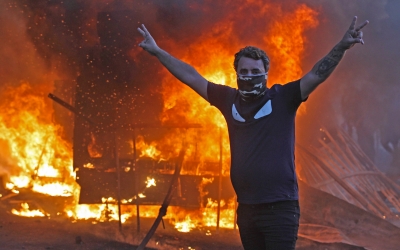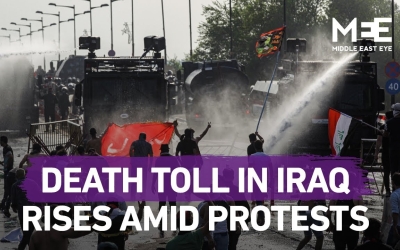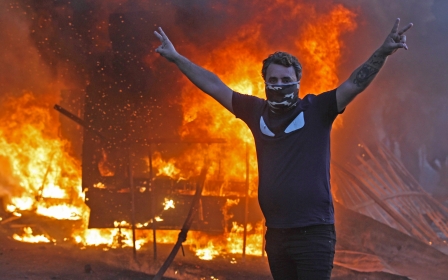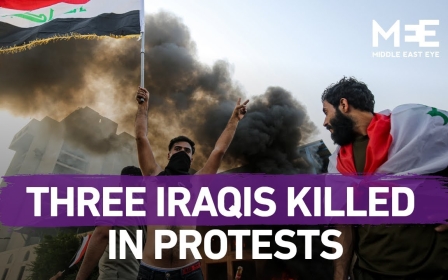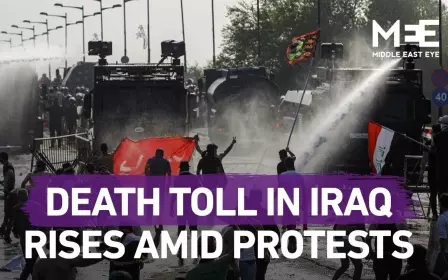'We still keep protesting': Dozens dead and hundreds wounded in Iraq
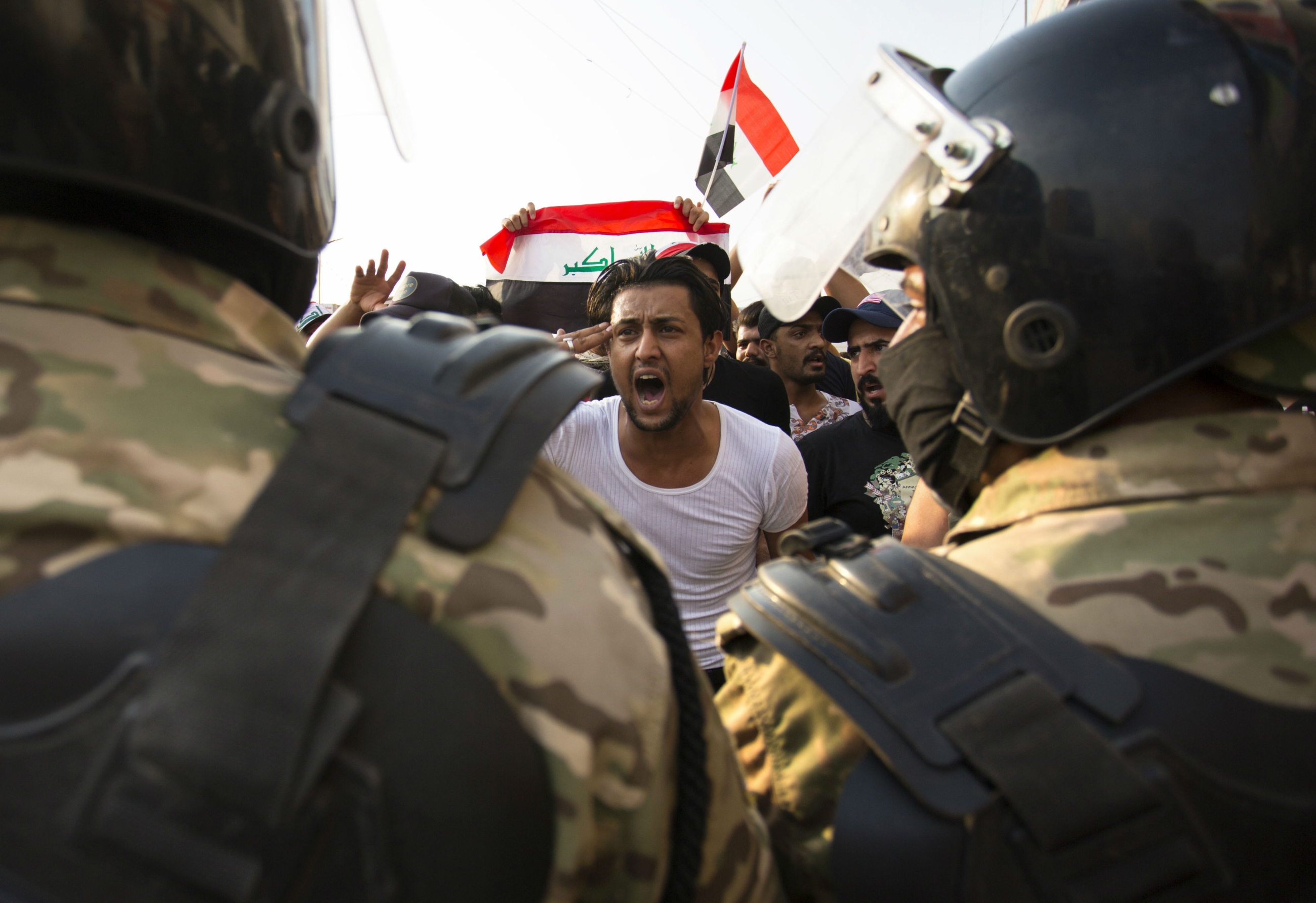
Dozens of people have been killed and hundreds wounded so far in violent demonstrations that have escalated by the day, sweeping across southern cities since they first erupted in the capital on Tuesday.
Police opened fire on protesters in central Baghdad on Friday as hundreds gathered to demonstrate against the government, shooting and critically wounding at least one person.
Police snipers had taken positions on rooftops and fired single shots at protesters as they gathered, hitting one of them in the neck.
The unrest, fuelled by popular rage over poor living standards and corruption, is the first major challenge for Prime Minister Adel Abdul Mahdi, who took office last year backed by Shia parties that have dominated Iraq since the 2003 fall of Saddam Hussein.
Abdul Mahdi said on Thursday that no "magic solution" was available to satisfy the protesters' demands, pledging only vague reforms unlikely to placate Iraqis.
New MEE newsletter: Jerusalem Dispatch
Sign up to get the latest insights and analysis on Israel-Palestine, alongside Turkey Unpacked and other MEE newsletters
An ongoing curfew in the capital, defied by thousands of demonstrators on Thursday, saw army and special forces deploy around central squares and streets.
Curfews are in place in several cities including Nassiriya, Amara and Hilla.
'Three bullets were in Hussein's head'
In Basra, activist Hind al-Samer told Middle East Eye that her close friends Hussein Adil and his wife, Sara had been killed after taking part in protests in the southern city.
"On Thursday morning, two cars, a Salvador and a pick up, loaded with six masked men wearing black, stopped in front of Hussein’s house," said Samer.
"Two of them pushed themselves inside the house and the rest waiting outside.
"Hussein and his wife are activists, all they were doing was protesting against the corruption, and saving the protesters, and providing them with medical aid."
Samer said the identities of the killers are not known.
“But personally, I think they were Iran-backed militias, as Iran has power and had a vital role in killing tens of demonstrators in last summer protests," she said.
According to Samer, Hussein and Sara's killers pursued her and others as they took the wounded to hospital.
"They forced us out of the hospital, and prevented anyone entering to see the corpses. Three bullets were in Hussein’s head and one in his wife’s head," she said.
"Every protest, we were protesting together, they are very peaceful youths with very sweet hearts.
"Hussein and his wife faced threats due to their participation in last year's protests and they fled to Turkey, but they came back to Iraq this year, and now we have lost them, we're sorry."
'There is an Iranian influence'
On Friday, Reuters news agency, citing security and medical sources, said 65 people had died across Iraq since the protests began on Tuesday.
Hundreds of people have been wounded as security forces opened fire to disperse the crowds, and demonstrators in some areas have shot back.
Mahmoud Rakan, a Baghdad-based protester, told MEE that "the protesters' corpses had bloodied the streets".
"The number of dead and wounded announced by the ministry of health is not true and much higher," he said.
"I am protesting against the bad government and demanding our rights that we're deprived of, but the security forces dealt with us as if we were enemies, not the people of this country."
Laith al-Majed, another Baghdad-based protester, accused Iran of taking a hand in the protests and attacking peaceful protesters.
"There is an Iranian influence to Baghdad’s Tahrir [Square] protest," Majed told MEE.
"I witnessed many people wearing black who opened fire toward us, I heard them speak Persian.
"The tear gas cans used, written on the bottom of them was 'made in Iran'.
“Despite the government cutting the internet services and imposing a curfew, we still keep protesting."
'We do not live in ivory towers'
Oil production in Iraq is at record levels providing a windfall income for Baghdad.
However, after decades of war and sanctions, the country's infrastructure is still decrepit, cities are in ruins and there are few employment opportunities for a population of 40 million.
Protesters say funds are being siphoned off by political parties who have a firm grip on power in Baghdad.
Abdul Mahdi acknowledged the public discontent in an overnight television message, insisting politicians were aware of the suffering of the masses.
"We do not live in ivory towers - we walk among you in the streets of Baghdad," he said.
He called for calm and for support from lawmakers to reshuffle cabinet posts away from the influence of big parties and groups.
'The blood of Iraqis means nothing for him'
Abdul Mahdi said a basic wage for poor families would be discussed by the government, but that no "magic solutions" were available to fix the country.
Mustafa Nabeel, a 29-year-old resident of Basra, told MEE: "Only stupid people believe Abdul Mahdi's speech, today he promises us jobs and a salary for each family with low wages, but I know it is just a lie to calm the anger of the people.
"And we know this game, that is why we will still keep protesting until we get our demands [satisfied] by hand."
Muna Majeed, a 37 year-old based in Karbala said: "Adel Abdul Mahdi remaining in power means more Iranian intervention in Iraq, so that is why we want a radical change in power from its roots.
"I ask Abdul Mahdi to submit his resignation and give the power to another one, who has no ties to other countries, and works for Iraq," she told MEE.
Baghdad based Hussein Al-Asaadi said: "Since 2003 until now, Shia power offers nothing to Iraqis, and what he [Abdul Mahdi] mentioned is an anesthetic to the people.
"We will never trust this government anymore, such a dictatorial government!" the 30-year-old told MEE.
Basra local Haider Laith said: "Killing tens of protesters and wounding thousands, it is proof that Adel Abdul Mahdi is a war criminal and that he ordered the security forces to do this and the blood of Iraqis means nothing for him.
"I ask the international community to punish him as a lesson to anyone who will rule Iraq in the future," the 31-year-old told MEE.
Cleric criticises Iraqi leaders
On Friday, Iraq's top Shia cleric, Grand Ayatollah Ali al-Sistani, urged security forces and protesters not to use violence, and criticised Iraqi leaders for failing to eradicate corruption, blaming lawmakers in particular.
"It is sorrowful that there have been so many deaths, casualties and destruction" from days of clashes between anti-government protesters and security forces, Sistani said in a letter read out by his representative Ahmed al-Safi during a sermon in the holy city of Karbala.
"The government and political sides have not answered the demands of the people to fight corruption or achieved anything on the ground," he said.
"Lawmakers hold the biggest responsibility for what is happening."
Late on Friday, prominent Shia cleric Moqtada al-Sadr also urged the Iraqi government to step down, calling for new elections.
Qatar's foreign ministry advised its citizens on Friday not to travel to Iraq and urged those already there to leave immediately in view of ongoing unrest.
Bahrain had issued a similar warning on Thursday.
Reuters and AFP contributed to this report
This article is available in French on Middle East Eye French edition.
Middle East Eye delivers independent and unrivalled coverage and analysis of the Middle East, North Africa and beyond. To learn more about republishing this content and the associated fees, please fill out this form. More about MEE can be found here.


